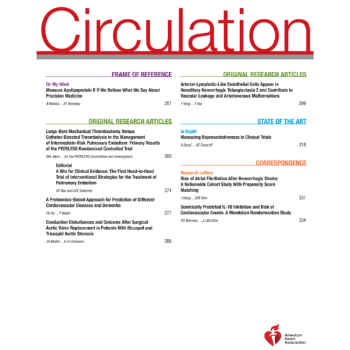 Congratulations to Dr Stephen Brennan and all the team involved in their Circulation published research titled, 'Genetically Predicted IL-18 Inhibition and Risk of Cardiovascular Events: A Mendelian Randomization Study'.
Congratulations to Dr Stephen Brennan and all the team involved in their Circulation published research titled, 'Genetically Predicted IL-18 Inhibition and Risk of Cardiovascular Events: A Mendelian Randomization Study'.
The Mendelian randomisation study identifies a novel protein treatment target for several cardiovascular conditions, including cardioembolic stroke, atrial fibrillation, and heart failure. The team utilised large-scale multi-omic data from over 1.3 million individuals to show that genetically downregulated IL-18 signalling is associated with a lower lifetime risk of cardiac remodelling, heart failure, and cardioembolic stroke.
The team’s findings provide compelling genetic evidence that the IL-18 signalling pathway represents a promising drug target for preventing heart failure and cardioembolic stroke. Anti-IL-18 monoclonal antibodies, currently in development for autoimmune conditions, could potentially be repurposed to treat these cardiovascular diseases.
This study included several UCD-affiliated authors, including Dr. Stephen Brennan (first author and physician, Mater Misericordiae University Hospital), Dr John McCabe (senior author and assistant professor, UCD School of Medicine), Professor Peter Kelly (clinical professor of neurology, UCD School of Medicine), Dr Sarah Gorey (PhD candidate, UCD School of Medicine), Pádraig Synnott (MD candidate, UCD School of Medicine), Professor Niall Mahon (clinical professor, UCD School of Medicine) and Professor Gavin Blake (clinical professor, UCD School of Medicine).
Many other institutions were involved in the research including University of Galway, University of Cambridge, Imperial College London, Harvard University, Edinburgh University and LMU Munich.
Abstract
Background: Inflammation is an emerging target for the prevention and treatment of cardiovascular disease (CVD). This drug-target Mendelian randomization (MR) study aimed to predict the on-target effects of IL-18 inhibition on CVD risk. Furthermore, we aimed to explore the effects of IL-18 inhibition on cardio-metabolic traits, cardiac structure, and function, and identify potential adverse outcomes.
Methods: We selected five independent circulating IL-18-lowering variants around the IL-18 gene locus from the Systematic and Combined AnaLysis of Olink Proteins (SCALLOP) consortium. We then performed two-sample MR analyses to investigate the association of genetically proxied IL-18-inhibition on downstream inflammatory markers, risk of CVD, cardiac magnetic resonance (CMR) imaging measurements of cardiac structure and function, cardiometabolic traits, and a selection of potential adverse effects. We utilized data from the UK Biobank, Cardiogram, GIGASTROKE, and other large genomic consortia (sample range: 3,301-1,320,016).
Results: Following correction for multiple comparisons, one standard deviation (SD) lower in genetically-predicted circulating IL-18 was associated with reductions in downstream biomarkers of IL-18 signaling, including C-reactive protein (SD change -0.02, 95% CI -0.03, -0.02), tumor necrosis factor (SD change -0.19, CI -0.25, -0.14), interferon-gamma (SD change -0.15, CI -0.22, -0.08), and CXCL10 (SD change -0.13, CI -0.16, -0.09). Lower genetically-predicted IL-18 levels were associated with reduced risk of cardio-embolic stroke (Odds Ratio [OR] 0.85, CI 0.79-0.92), but not other stroke subtypes. Furthermore, lower genetically predicted IL-18 levels were associated with reduced risk of peripheral arterial disease (OR 0.91, CI 0.84-0.97), atrial fibrillation (OR 0.94, CI 0.89-0.99), and heart failure (OR 0.84, CI 0.77-0.92), as well as improvements in CMR traits, including a reduction in left atrial volume (β -0.02, CI -0.03, -0.00). Lower genetically-predicted IL-18 levels were associated with lower risk of chronic kidney disease, autoimmune diseases, a favorable cardio-metabolic profile, and higher odds of lung cancer, but not infections.
Conclusions: Our study provides genetic support that impaired IL-18 signaling may be causally associated with a lower risk of cardio-embolic stroke, possibly mediated through prevention of cardiac re-modelling, heart failure and atrial fibrillation. IL-18 represents a potential target for anti-inflammatory therapy in stroke and CVD that warrants further investigation in clinical trials.
Circulation link.